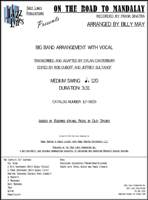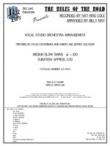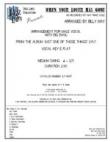ON THE ROAD TO MANDALAY
Recorded by Frank Sinatra
Arranged by Billy May, Transcribed by Dylan Canterbury, Edited by Rob DuBoff and Jeffrey Sultanof

Cat #: JLP-9829
$75.00This item usually ships within 1 business day.
Questions?
Please call +1-518-587-1102 or email us.
Edition: Jazz Big Band Arrangement with Vocal
Description: Swing - Advanced
Publisher: Jazz Lines Publications
Taken from Frank Sinatra's classic 'Come Fly With Me' album, 'On The Road To Mandalay" is an Oley Speaks song that was based on a Rudyard Kipling poem titled 'Mandalay.' Billy May's arrangement is a complete masterwork, swerving back and forth between theatrical and hard swinging without ever skipping a beat.
A slightly tongue-in-cheek opening fanfare sets up Sinatra's entrance at measure 5, accompanied at first by only bass and tambourine. Aside from a brass blast at measure 12, the backgrounds are largely subdued in volume, but have a nice sense of rhythmic diversity. This changes with a rapid ascending brass and woodwind line that leads into a shift from minor to major key at measure 25.
Some more cheeky background figures in the horns behind Sinatra eventually shift the arrangement into a key change at measure 43, where the band gets to strut its stuff for a bit. Barring a two-measure quasi-march figure in the trombones, the shout is typically hard-swinging May. After the ensemble reaches peak volume and intensity, there is an interlude to set up another key change for Sinatra's re-entrance with the melody's final verse.
Although the backgrounds behind this final verse are harmonically and rhythmically different than those at the beginning, they follow a similar musical development as before, complete with a rapidly ascending brass and woodwind figure to set up the shift from major to minor once more at measure 83. The arrangement's conclusion is a slow-burning build that begins at measure 91. Starting with the lowest part of the band, the trombones and tuba, everything gradually swells upward throughout the remaining sections. As Sinatra intones "the dawn [coming] up like thunder," the saxophones provide said thunder under a hard-riffing brass section. The arrangement concludes with an ascending saxophone line encompassing a militaristic brass fanfare, capped off by one final gong hit that should be allowed to ring out as long as naturally possible.
This arrangement is for jazz big band with male vocal. There are also additional tuba and auxiliary percussion parts. Alto saxophones double on piccolo, tenor saxophones double on flute, and baritone saxophone doubles on bass clarinet. The vocal key modulates between Eb and C.
2 Alto Saxophones (Both Double Piccolo)
2 Tenor Saxophones (Both Double Flute)
Baritone Saxophone (Doubles Bass Clarinet)
4 Trumpets
3 Trombones
Bass Trombone
Tuba
Guitar
Piano/Celeste
Bass
Percussion: Glockenspiel/Timpani/Gong/Xylophone
Drums (with Temple Blocks and Finger Cymbals)
Trumpet 1: E6
Trombone 1: B4










